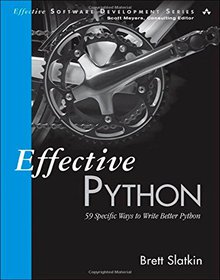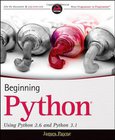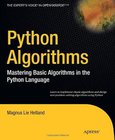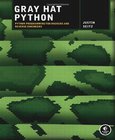Effective Python
59 Specific Ways to Write Better Python

Book Details:
| Publisher: | Addison-Wesley Professional |
| Series: | Addison Wesley , Effective |
| Author: | Brett Slatkin |
| Edition: | 1 |
| ISBN-10: | 0134034287 |
| ISBN-13: | 9780134034287 |
| Pages: | 256 |
| Published: | Mar 08 2015 |
| Posted: | Apr 30 2015 |
| Language: | English |
| Book format: | |
| Book size: | 12.27 MB |
Book Description:
It's easy to start writing code with Python: that's why the language is so immensely popular. However, Python has unique strengths, charms, and expressivity that can be hard to grasp at first -- as well as hidden pitfalls that can easily trip you up if you aren't aware of them. Effective Python will help you harness the full power of Python to write exceptionally robust, efficient, maintainable, and well-performing code. Utilizing the concise, scenario-driven style pioneered in Scott Meyers's best-selling Effective C++, Brett Slatkin brings together 59 Python best practices, tips, shortcuts, and realistic code examples from expert programmers. Through realistic examples, Slatkin uncovers little-known Python quirks, intricacies, and idioms that powerfully impact code behavior and performance. You'll learn how to choose the most efficient and effective way to accomplish key tasks when multiple options exist, and how to write code that's easier to understand, maintain, and improve. Drawing on his deep understanding of Python's capabilities, Slatkin offers practical advice for each major area of development with both Python 3.x and Python 2.x. Coverage includes: Algorithms Objects Concurrency Collaboration Built-in modules Production techniques And more Each section contains specific, actionable guidelines organized into items, each with carefully worded advice supported by detailed technical arguments and illuminating examples. Using Effective Python, you can systematically improve all the Python code you write: not by blindly following rules or mimicking incomprehensible idioms, but by gaining a deep understanding of the technical reasons why they make sense.
Download Link:
Related Books:
Beginning Python
Using Python 2.6 and Python 3.1
Beginning Python: Using Python 2.6 and Python 3.1 introduces this open source, portable, interpreted, object-oriented programming language that combines remarkable power with clear syntax. This book enables you to quickly create robust, reliable, and reusable Python applications by teaching the basics so you can quickly develop Web and scientific applications, incorporate databases, and master systems tasks on various operating systems, including Linux, MAC OS, and Windows. You'll get a comprehensive tutorial that guides you from writing simple, basic Python scripts all the way through complex concepts, and also features a reference of the standard modules with examples illustrating how to implement features in the various modules. Plus, the book cov...
Python Algorithms
Mastering Basic Algorithms in the Python Language
Python Algorithms explains the Python approach to algorithm analysis and design. Written by Magnus Lie Hetland, author of Beginning Python,this bookis sharply focused on classical algorithms, but it also gives a solid understanding of fundamental algorithmic problem-solving techniques. The book deals with some of the most important and challenging areas of programming and computer science, but in a highly pedagogic and readable manner. The book covers both algorithmic theory and programming practice, demonstrating how theory is reflected in real Python programs. Well-known algorithms and data structures that are built into the Python language are explained, and the user is shown how to implement and evaluate others himself. What youll learn Tra...
Gray Hat Python
Python Programming for Hackers and Reverse Engineers
Python is fast becoming the programming language of choice for hackers, reverse engineers, and software testers because it's easy to write quickly, and it has the low-level support and libraries that make hackers happy. But until now, there has been no real manual on how to use Python for a variety of hacking tasks. You had to dig through forum posts and man pages, endlessly tweaking your own code to get everything working. Not anymore.Gray Hat Python explains the concepts behind hacking tools and techniques like debuggers, trojans, fuzzers, and emulators. But author Justin Seitz goes beyond theory, showing you how to harness existing Python-based security tools - and how to build your own when the pre-built ones won't cut it.You'll learn how to: Aut...
2007 - 2021 © eBooks-IT.org



